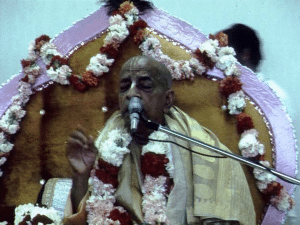"You mind your own business!"
Srila Prabhupada was soon traveling again, Panditji and I with him, to Calcutta en route to Mayapur for the first international gathering of ISKCON devotees.
One day in Calcutta I received another short, but merciful chastisement. It had to do with the kitchen in the Calcutta temple, which I found chaotic, and, in some details, unclean. Srila Prabhupada had asked me to learn how to cook shukta from his sister, Pisima, and so I was observing her working in the kitchen.
I had met Pisima in 1973 and found her kind to sannyasis?she liked to bring them food?and she was of course very devoted to her brother, Srila Prabhupada, constantly coming by to bring him a tiffin full of preparations cooked in mustard oil and heavy with spices. Devotees sometimes dreaded offering them to Prabhupada, fearing they would cause him indigestion, but Pisima had a free pass to enter Prabhupada's room whenever she desired and to offer him her devotedly prepared foodstuff.
Prabhupada particularly liked her shukta. He had taught me in Los Angeles how to make this wet vegetable preparation using kerela (bitter melon), squash, cauliflower, potatoes, pakora, eggplant and yogurt, and I had written it down in a notebook. But I had never mastered the intricate steps necessary to make it to Prabhupada's satisfaction. Although I could not speak any Bengali and Pisima could not speak any English, I watched her very carefully and took notes. She had her own techniques and ingredients for shukta in addition to what Srila Prabhupada had showed me, and I tried to study and memorize each step. For two successive days?the duration of our stay in Calcutta?I watched the operation and felt that on the next occasion I could do it myself.
During the course of my lessons, I was sometimes bewildered by conditions in the kitchen. Actually, there was no kitchen per se, no separate room with a sink or cooking range, only a small space in the rear of the temple building with a bucket of flaming coals for cooking and a bucket of water for washing pots. And the methods of Indian cooking were totally strange to me. They did everything in a simple, nonmechanized fashion-like cutting vegetables while squatting on the floor.
The shortage of space created a chaotic situation. Bengali ladies came in and out on errands, and workers moved around the kitchen on business unrelated to Prabhupada's lunch. Understanding neither Bengali nor Hindi, I usually couldn't tell what people were doing, and I worried that the lunch would be delayed.
Pisima seemed to be delaying also. Catching her attention and pointing to my watch made no impression on her. I had to stand by and observe without any hope of changing things, even when I saw something I thought wasn't up to Prabhupada's standard. Something about the use of water bewildered me, and in one of my entries into Prabhupada's room, I made a derogatory remark for which I paid dearly. My tone was not flippant but again, anxiety-filled. I had thought I should inform him of the strange things going on.
"Srila Prabhupada," I began, "you say that the Indian culture is suci, cleaner than America which is mleccha, but it appears to me that the kitchen here is dirty?"
"You mind your own business!" Prabhupada said sharply. His words were like a slap and immediately brought me to my senses. There was no need for more discussion. I left his room and hurried back to the kitchen to get his lunch, realizing that I had fallen into mundane, pro-Western faultfinding. Why had I allowed myself to get unnecessarily worked up just because of some cultural differences? Prabhupada wasn't concerned, so why should I be? I remembered running to him in confusion about how to handle guests. He had told me, "Everything is all right." Now he had said the same thing in a different way: mind your own business. Don't get on the mental plane of rejection and acceptance about temporary things. Don't identify with the body and mind, thinking, "I am an American." Just mind your own business. Serve your spiritual master and don't worry.
When I returned to his room, carrying his tray filled with little stainless steel cups containing the different preparations cooked by Pisima, Prabhupada was very patient and pleasant. He knew far better than I did that the material world is a chaotic place and that a devotee has to keep a cool and sober head. And he also knew, to a degree that I could not imagine, the soothing shelter of Krishna's lotus feet.
Sunshine was brightening his room, and birds were singing at his open window as I left Srila Prabhupada to take his prasadam in peace. Despite a cacophony of sounds from the streets?creaking rickshas, honking automobiles, and hawkers shouting for customers?Prabhupada sat serenely, honoring prasadam. For myself, it had been a grueling session, overlooking the Indian ladies cooking while praying it would be ready on time. Now I stood outside Prabhupada's door, relieved, reprimanded, and feeling myself the most fortunate devotee in the crowded temple.
Reference: Life with the perfect master - A personal servants account by Satsvarupa Das Goswami
Recently Added
Trending Today
